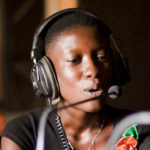Media Centre - Media release - 14 November 2018
Girls worldwide facing catastrophic consequences of conflicts reveals Plan International study

Adolescent girls worldwide are facing catastrophic consequences of conflicts and forced displacement as they battle sexual violence, isolation and feelings of suicide, a new report by child rights organisation Plan International reveals.
The report: Adolescent Girls in Crisis: Experiences of Risk and Resilience Across Three Humanitarian Settings, for the first time captures the voices and experiences of girls in the three of the world’s most troubled and volatile locations: South Sudan, the Lake Chad Basin and the Rohingya refugee camps in Bangladesh.
It comes after Myanmar and Bangladesh agreed to begin repatriating refugees in mid-November. The announcement was made less than a week after United Nations investigators warned that the genocide against the Muslim minority was continuing in Myanmar.
Close to 1000 girls aged 10 to 19 were surveyed in Niger, Nigeria, Cameroon, South Sudan, Uganda and Bangladesh. Additionally, in-depth interviews and group discussions were conducted with around 400 girls.
Chilling accounts of adolescent girls’ experiences, documented in the study, show that despite their different contexts and cultures, adolescent girls share a similar plight ranging from discrimination and sexual violence to child marriage and dropping out of education. They face unique risks because of their gender and age. The report throws a spotlight on girls’ lives and their states of mind as they struggle to survive daily tragedies.
In Bangladesh, Rohingya refugee girls reported how they have been condemned to an isolated life where they spend almost 24 hours a day confined to their tiny tents in the stifling heat. Fear of violence in the camp and attitudes of their families means girls can’t leave their shelters even though they would very much like to.
“There is no doubt that adolescent Rohingya girls are one of the greatest victims in this humanitarian crisis,” said Orla Murphy, Plan International’s Country Director in Bangladesh.
“The cramped and overcrowded conditions – not only in the camps, but also inside the tiny tents they now call home – are having a devastating impact on their lives.
“Many of the girls have witnessed horrific violence and are in urgent need of assistance, but they cannot access any of the services on offer to help them cope with what they have been through.”
One in four girls interviewed in South Sudan said they considered ending their lives in the last 12 months. About 4 million people have been displaced due to conflict in the war-torn country and about 2.4 million of them are children. The UN estimates that almost two million girls and women are at risk of gender-based violence. The girls surveyed reported facing threats of murder, abduction, rape and sexual assault, which often occur when they leave their homes to fetch food, water or firewood for their families.
“I do not feel safe walking around during the day because girls often become victims of rape in the area,” said a girl in Nimule, South Sudan.
The Lake Chad Basin research covering Niger, Nigeria and Cameroon shows that violence has infiltrated and permeated almost every aspect of girls’ lives. Girls spoke about the threat of attacks and kidnap by armed insurgents, and fear of rape and sexual violence on the streets and in their homes.
“They married her out to the rapist,” said a 17-year-old girl in Nigeria.
Hussaini Abdu – Plan International’s Country Director in Nigeria, said: “Apart from what we found in our research, we also know that those kidnapped by Boko Haram are subject to forced marriage, rape and sexual slavery. Many conceive children as a result, becoming mothers when they are still just children themselves. For those who manage to escape – often with their children in tow – life is no better. They face stigma and rejection from their families and are unable to access services that have been designed to support survivors of gender-based violence.”
Plan International’s CEO Anne-Birgitte Albrectsen said: “Everybody caught up in war, famine, flood or any other emergency has their lives torn apart, but none more so than adolescent girls.
“The research clearly shows that girls in crisis are suffering some of the most horrific crimes and human rights violations, yet it is rare that either their own communities, governments or humanitarian agencies are paying much attention to them and their needs. We are all failing girls. This is shameful and unacceptable.”
Based on what girls have told about their experiences and priorities, Plan International is calling on the international community to take urgent action to ensure that girls are protected and given every opportunity to take part in decision making in all aspects of humanitarian response. The report also documents examples of girls’ resilience and shows they want to go to school, have a better future, and have more control and power over their lives.
“Tell our parents that school is important,” said a girl,13, from Lake Chad Basin.
“No humanitarian response can be effective if it ignores the voices and needs of one of the largest groups of sufferers. The international community and humanitarian agencies must radically change the way aid is designed and delivered. Girls caught up in crises worldwide need assistance that works for them and they need it now,” said Ms Albrectsen.
Plan International is also calling for adolescent girls to be given continued access to education as well as access to health information and services that are adapted to their needs, including mental health issues and sexual and reproductive health and rights.
About Plan International
Plan International is an independent development and humanitarian organisation that advances children’s rights and equality for girls.
We believe in the power and potential of every child. But this is often suppressed by poverty, violence, exclusion and discrimination. And it’s girls who are most affected. Working together with children, young people, our supporters and partners, we strive for a just world, tackling the root causes of the challenges facing girls and all vulnerable children.
We support children’s rights from birth until they reach adulthood. And we enable children to prepare for – and respond to – crises and adversity. We drive changes in practice and policy at local, national and global levels using our reach, experience and knowledge.
We have been building powerful partnerships for children for over 75 years, and are now active in more than 70 countries.
Media contacts

